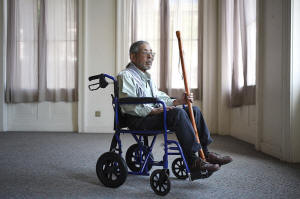Hate groups in the US decline but their influence grows, report shows
[May 23, 2025]
By TERRY TANG
The number of white nationalist, hate and anti-government groups around
the U.S. dropped slightly in 2024, not because of any shrinking
influence but rather the opposite. Many feel their beliefs, which
includes racist narratives and so-called Christian persecution, have
become more normalized in government and mainstream discourse.
In its annual Year in Hate and Extremism report, released Thursday, the
Southern Poverty Law Center said it counted 1,371 hate and extremist
groups, a 5% decline. The nonprofit group attributes this to a lesser
sense of urgency to organize because their beliefs have infiltrated
politics, education and society in general. Some of the ways they have
done this are through pushing for bans on diversity, equity and
inclusion initiatives, book bans and protests of drag story hours, the
report says.
Last year, there were 533 active hate groups. These include groups who
express views that are anti-LBGTQ+, anti-immigrant, antisemitic and
anti-Muslim. This number has been steadily declining since reaching a
historic high of 1,021 in 2018.
“The trends have slightly sort of gone up and down but let's just say
generally, since our tracking, have increased. And that's not just on a
total numbers level but also on a per capita,” said Rachel Carroll
Rivas, interim director of the SPLC’s Intelligence Project.
The number of anti-government groups last year totaled 838, an increase
from recent years, according to the law center based in Montgomery,
Alabama, that tracks racism, xenophobia and far-right militias. These
groups see the federal government as “tyrannical” and include militias
and self-described sovereign citizens.
Male supremacy also continues to emerge as an influential hate group.
The SPLC documented seven new male supremacist hate groups, making the
total 16. Their rhetoric espouses misogyny and strict gender roles.
Their rising influence came during an election year when the country saw
a woman of color be the first presidential nominee for a major political
party.

“I'm not sure it's a direct result of the candidacy of Kamala Harris,”
Rivas said. However, SPLC researchers went into chat rooms of white
supremacist organizations during the election and found “intense
vilification, the claiming of demonization of Harris as well as just the
pushing of the idea falsely that women would not be qualified.”
Some people on the far right have also pushed a belief that white
Christian culture is being threatened by a “demographic crisis”
including fewer births.
“Politicians, pundits and provocateurs on the right have turned toward
demonic language to tar those who disagree with them,” the report
states.
Last year's report found “record numbers” of white nationalist and anti-LGBTQ
groups in 2023. The analysis highlighted how far-right groups tried to
waylay democracy through disinformation, false conspiracy theories and
threats to election workers. It also examined how supporters of
Christian supremacy used similar topics to organize a movement toward
authoritarianism.
[to top of second column]
|

Prof. Aki Maehara poses for a photo before speaking at the Chinese
American Museum Thursday, May 22, 2025, in Los Angeles. (AP
Photo/Jae C. Hong)

The SPLC is a liberal advocacy organization that, besides monitoring
hate groups, files lawsuits over justice issues and offers
educational programs to counter prejudice. Frequently criticized by
conservatives as biased, the nonprofit has faced lawsuits for its
designation of some organizations as hate groups.
The report's release comes as a Los Angeles college professor made
an appearance in front of media and supporters a few weeks after he
was severely injured in a hit and run that he reported as a hate
crime. Aki Maehara, 71, arrived at the Chinese American Museum in
downtown Los Angeles on Thursday morning in a wheelchair but was
able to walk himself to a podium.
“All of your support, concern and care has helped to speed up my
healing and has helped to raise my spirits,” Maehara told the crowd.
Photos of his injuries posted to a GoFundMe page have been shared
multiple times on social media with users calling for hate crime
charges. The crowdsourcing campaign has raised almost $80,000 for
Maehara as of Thursday.
Maehara said he is considering directing some of the funds “to other
victims of Asian hate violence and other victims of racist violence
who are currently in need of support."
“I am wanting to add my voice to efforts to address fascist, racist
violence directed against Asian Pacific Islander Americans,
immigrant communities, all targeted communities and individuals
during our current crisis," he said.
Maehara was riding his electric bicycle in Montebello, 10 miles (16
kilometers) east of downtown Los Angeles, on April 29 when he says
heard a driver yell a racial slur. Maehara says a car then struck
him and the driver fled. He was hospitalized with a concussion, neck
injury, cheek bone fracture, bruises and swelling up and down his
body among other injuries.
Maehara, who is Japanese American, teaches a course on the history
of racism in the U.S. at East Los Angeles College. He returned to
the classroom last week, according to multiple outlets.
The Montebello Police Department is investigating and treating the
hit and run as a violent hate crime, said Det. Craig Adams. The
department is seeking out video from homes in the neighborhood.
“We are still canvassing," Adams said. “It's taken front row ahead
of some other cases.”
All contents © copyright 2025 Associated Press. All rights reserved |